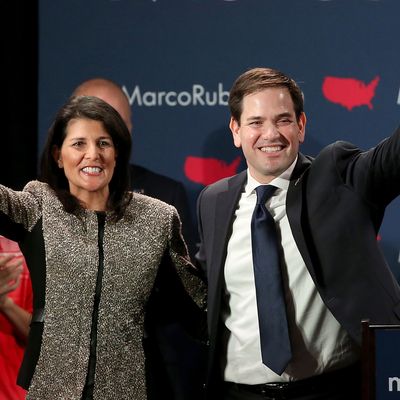
One of the problems with being a veteran political observer is that you are constantly suffering from a sense of déjà vu. I am currently experiencing that with the flavor-of-the-week candidacy of Nikki Haley. She’s a non-WASP media darling with impeccable “movement conservative” credentials and a “moderate” image, who’s currently surging in the early states and offering Republicans a respectable alternative to Donald Trump. Where have we heard that before? Oh, that’s right: It was how Marco Rubio’s campaign was initially perceived in 2016!
The Haley-Rubio parallels aren’t perfect, but they are impressive. The 2016 Iowa caucus was initially seen as a battle between celebrity front-runner Trump and his more-conservative-than-thou rival Ted Cruz, who relied on a well-developed ground game and intense pandering to conservative Evangelicals to outflank the amateurish Trump campaign (it’s no accident that Ron DeSantis has deployed the exact same strategy in Iowa, led by veterans of Cruz ’16).
Then Rubio excited Never Trump Republicans with a late surge and close third-place finish in Iowa. He was definitely the favorite of Republican Establishment types who hated Cruz, feared Trump, and were shocked by Jeb Bush’s terrible campaign. Today, Republican Establishment types who dislike DeSantis and fear Trump more than ever are rapidly consolidating behind Haley.
The similarities don’t end there. Haley, who was serving as South Carolina governor in 2016, endorsed Rubio shortly before her state’s primary (which Trump ultimately won). Both Haley and Rubio got their big career breaks as part of the tea-party wave of 2010 — Haley as the “conservative reformer” blessed by Sarah Palin and the Sanford-DeMint wing of the Palmetto State GOP, Rubio as the true-conservative conqueror of Charlie Crist. Both politicians were viewed as a sign of a more diverse if even more ideologically rigid GOP (Haley is Indian American and Rubio is Cuban American).
Both Rubio and Haley have been outspokenly hawkish on defense matters, giving Trump’s “America First” messaging a wide berth. And they have thrilled movement-conservative types by embracing the cause of entitlement reform, which is immensely unpopular (to actual voters, if not GOP politicians). Here’s a common reaction to Rubio battling Trump on Social Security in 2016:
Haley’s singing the same tune right now, as CNN reports:
Haley has called for several changes to the nation’s safety net programs, including increasing the age at which today’s younger workers would become eligible for Social Security retirement benefits and limiting the growth of benefits the wealthy receive.
“I recognize that Social Security and Medicare are the last thing the political class wants to talk about,” she said during a September speech unveiling her economic proposals.
But, Haley said, “any candidate who refuses to address them should be disqualified. They’ll take your vote and leave you broke.”
Trump sharply differed with Rubio on this subject in 2016. And if he ever deigns to take Haley seriously in 2024, she’ll undoubtedly get the same treatment, since he went after Ron DeSantis on “entitlement reform” back when the Floridian was a bigger threat to the former president.
Notwithstanding some of the controversial positions they’ve both taken, Rubio and Haley also share a reputation for inconsistency and even flip-flopping. Rubio as a “weather vane” became one of the most significant memes of the 2016 nomination contest (and even beyond it, as Rubio went back on a commitment not to run for another Senate term after Trump dispatched him). Haley is described so often as an “opportunist” that it could become her middle name. And their respective yet similar relationships to Trump particularly exhibit a wandering moral compass.
Rubio criticized Trump more often than any other 2016 GOP candidate, calling out his heresies against conservative orthodoxy, treating him as a con artist, and even descending to a snarky NSFW comment about the size of his hands. Yet when the mogul vanquished him, Rubio crawled back into his good graces with all deliberate speed, and has been a reliable MAGA loyalist in the Senate and the GOP ever since. Similarly, Haley has alternated regularly between disrespecting and praising Trump for years now. And while Trump’s refusal to participate in candidate debates has kept Haley from any direct collisions, she will have to go after him if she succeeds in becoming his chief rival (even though she has committed to supporting him as nominee even if he is a convicted felon).
The odds remain high that Haley will ultimately fail like Rubio did. True, she may not bomb in a debate like Rubio did prior to the 2016 New Hampshire primary, when a robotic performance led to a supremely disappointing fifth-place finish. But Rubio was eventually knocked out of the race when the then–New Yorker clocked him in his home state of Florida. Haley could have a similar fate in her own home state of South Carolina, where Trump currently leads her by 30 points in the RealClearPolitics polling averages.
If that’s how it happens, will Nikki Haley be able to make up with her former boss the way Rubio did? That’s an open question. So far, Trump has limited the insults he’s tossed her way to calling her “Birdbrain,” which is bad but not lethal. In 2016, he called Rubio, among less substantive insults, corrupt and ineffective. And perhaps the thing the 45th president has most in common with Rubio and Haley (aside from support for many reactionary policies) is an exceptional flexibility about past utterances and attitudes when it serves their purposes.
More on politics
- Everyone Biden Has Granted Presidential Pardons and Commutations
- Trump Is Threatening to Invade Panama, Take Back Canal
- What Happened to Texas Congresswoman Kay Granger?






























